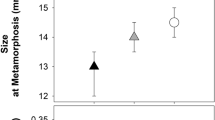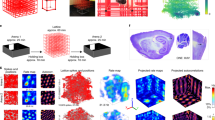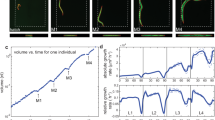Abstract
PREVIOUS investigations have shown that, although sufficiently high gravity as simulated by continuous centrifugation can retard growth of certain organisms, a moderate increase in the gravitational field intensity can sometimes slightly enhance growth1–3. A similar pattern is reported here for juvenile red-eared turtles (Pseudemys scripta elegans). However, a more dramatic growth enhancement was obtained during moderate centrifugation than had been obtained with other forms.
This is a preview of subscription content, access via your institution
Access options
Subscribe to this journal
Receive 51 print issues and online access
$199.00 per year
only $3.90 per issue
Buy this article
- Purchase on SpringerLink
- Instant access to full article PDF
Prices may be subject to local taxes which are calculated during checkout
Similar content being viewed by others
References
Gray, S. W., and Edwards, B. F., J. Cell. and Comp. Physiol., 46, 97 (1955).
Wunder, C. C., Herrin, W. F., and Crawford, C. R., Growth, 23, 349 (1959).
Wunder, C. C., Briney, S. R., Kral, M., and Skaugstad, C., Nature, 188, 151 (1960).
Thompson, D'A. W., On Growth and Form, second ed., 22, 194, 958 (Cambridge Univ. Press, 1942).
Author information
Authors and Affiliations
Rights and permissions
About this article
Cite this article
DODGE, C., WUNDER, C. Growth of Juvenile Red-eared Turtles as influenced by Gravitational Field Intensity. Nature 197, 922–923 (1963). https://doi.org/10.1038/197922a0
Issue date:
DOI: https://doi.org/10.1038/197922a0



